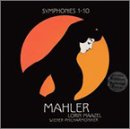| All Artists: Mahler, Maazel, Vpo Title: Complete Symphonies 1-10 ( Mahler ) Members Wishing: 0 Total Copies: 0 Label: Sony Release Date: 1/7/2003 Album Type: Box set, Limited Edition Genre: Classical Style: Symphonies Number of Discs: 14 SwapaCD Credits: 14 UPC: 696998787421 |
Search - Mahler, Maazel, Vpo :: Complete Symphonies 1-10 ( Mahler )
 | Mahler, Maazel, Vpo Complete Symphonies 1-10 ( Mahler ) Genre: Classical
|
Larger Image |
CD DetailsSimilar CDs |
CD ReviewsBetter to think twice! Bart Verhaeghe | Belgium (Europe) | 02/15/2005 (2 out of 5 stars) "Since they appeared in this complete set two years ago, I listened to these recordings a lot. Some people really like these performances, that's ok, but I agree with what the press wrote 20 years ago when these recordings first appeared. Why? First of all, they are too analytical, studies and calculated (to quote one other reviewer). OK, I deeply respect that kind of view towards Mahler. I appreciate a rather clear view (although not my favourite). They miss too much inspiration secondly. Go for Boulez if you want a analysed approach!! His interpretation is far more consistent, inspired, better played and recorded, and beautifully clear. My advise; Analyse it, study it, calculate it, and THEN play it. Maazel has always been a conductor who raised mixed feelings with me. If you see his conducting, he's always like a policeman guiding the traffic through a symphony. Immediately that has it's repercussions on the orchestra. Distant interpretations and not very involving. His tempi are mostly on the slow side, and sometimes really so slow that all consistency is lost. Listen to the last movement of the 4th symphony, or the last march in the 1st movement of the 3rd symphony. Anyway, he's a capable man who earns the proper respect. The Vienna Philharmonic is playing fantastic as ever... Although, trombones that enter bars too early (3rd symphony), woodwinds seriously out of tune from time to time. Unequal sounding strings in the later symphonies, one can always accept smaller mistakes, but too much is too much (for me it is). The recording sound is ok, nicely done, but dull if you listen them after another. That's what I did, over and over again, and I came to the conclusion that these Mahler symphonies are like a good piece of pie, but without sugar and 'crème fraiche'. And that's what Mahler needs, a little diabolic shine. How much is a matter of taste. One more big shame is the booklet. No texts at all, and hardly you get the movement duration indicated, (full of mistakes, by the way). Certain movements take up to 20 more minutes than in reality... also, there is no choir mentioned for the 8th symphony (one of the better performances). Please SONY, correct those mistakes! The price is not low enough to abandon correctness on this! To conclude, this set cannot match sets like Abbado, Bernstein, Chailly, Ozawa, and even Tennstedt. Partially because of the lack of inspiration, partially because of small technical problems that make it unpleasant to listen this one. Buy it if you collect mahler symphonies. They won't come back soon after this release. SONY has it's reasons not to release this set too often. It's certainly not their best. Although it could have worked. Including the very poor booklet, I gave this one only 1 star, but since that's not the musician's fault, I don't count it." Seductive and ear opening rater25 | 08/14/2005 (4 out of 5 stars) "This set is usually underrated for reasons that are understandable. Maazel concentrates so intensely on bringing out details of Mahler's orchestration that the forward momentum and general structure of the piece are often lost. "The forest is lost for the trees", if you will. But what trees! I have never heard orchestral playing like the VPO delivers in these recordings. It's not just a matter of tonal beauty or technical perfection. Every player seems distinguished and is encouraged to play with maximum expression. You couldn't get further away from Karajanian homogeneity. And like close scrutiny of a painting one has seen only from a distance, one's appreciation of the work is seriously increased. I'm not sure this set is recommendable as a beginner's choice. But after getting the general rhetoric and dramatics of the pieces from, say, Kubelik or Haitink, it's a great way to get closer to these remarkable symphonies." Stunning T. Beers | 11/28/2003 (5 out of 5 stars) "I have tried numerous times without success to get this box set (including a rather fruitless series of emails to and from Sony) becuase it is simply a superb achievment. Maazel is profound in his understanding, the VPO is outstanding and the soloists are magnificent. The combination of Norman and Marton in the second is alone worth the price of admission. In the finale of the 2nd you can hear Norman's voice soaring above everyone and everything else--maybe it is just expert miking and mixing, but Norman is probably capable of it. Combine that with a brilliant organ entry and the chills just run up and down your spine. This is the recording to give to a friend--if only you could buy it. The 4th with Battle has always been regarded as one of the outstanding performances. I don't know why Sony makes it so hard to buy the set or buy individual recordings from it. They don't seem to realize what a treasure they are sittiing on."
|

 Track Listings (9) - Disc #1
Track Listings (9) - Disc #1